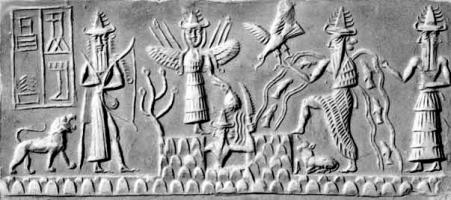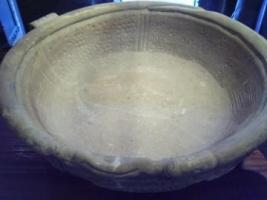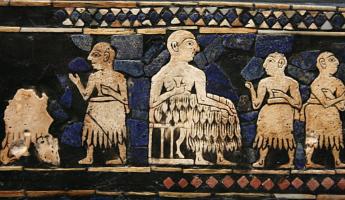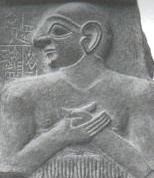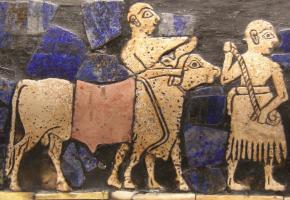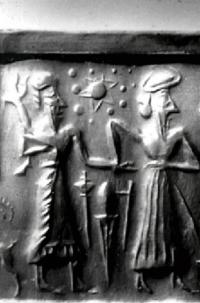The laws of the Sumerians

The Sumerians, whose origin is unknown, lived in Mesopotamia for more than a thousand years between the fourth and third millennia BC.
They invented writing, built great cities and developed the first collection of laws. Sumerian laws are characterized by great meekness.
Completely absent is the law of retribution (an eye for an eye, a tooth for a tooth), which underlies the Semitic legislation of the Code of Hammurabi.
Hammurabi, for example, stated that if the owner's son dies in the collapse of a house, the son of the house builder must be put to death.
The Sumerians preferred to help the victim by providing fair compensation for the damage done. If someone damages our car, it is more reasonable to get compensation to make repairs than to go and ruin the car of the person who damaged us.
Only in some very serious cases was the death penalty used, which could not be imposed by an ordinary judge but had to be decided by the ruler.
The ordeal, the divine judgment, was resorted to precisely when there was no other way to determine the guilt of the accused.
There was no provision for torture, physical punishment or even imprisonment. Location: Mesopotamia
Epoch: 4th-3rd millennium BC.
Sources
There is no Sumerian code. There are only scattered provisions or collections of laws issued by a ruler. It should also be kept in mind that many documents have been lost and what has come down to us is only a very small part of Sumerian legislation, which chance saved from destruction.
Only the Ur-Nammu codex is Sumerian, but Sumerian cultural influence continued, after the fall of Ur, for two more centuries. Therefore it is possible to refer, at least in part, to the legislation of the early Paleo-Babylonian period.
Ur-Nammu Code
The oldest Sumerian codex is that of Ur-Nammu, the former general who started the Third Dynasty of Ur and ruled from 2113 to 2096 B.C. over the country of Sumer and Akkad. The codex is written in Sumerian.
Code of Lipit-Ishtar
Another code is that of Lipit-Ishtar, king of Isin, who ruled from 1934 to 1924 BCE. Also under Isin's control were Nippur, Ur, Uruk, and Eridu. At this time Sumerian hegemony ended, the Semites gaining the upper hand. The code is written in Sumerian and there still remain values typical of Sumerian culture.
Sin-kashid Decree
We have news of a price decree of the Uruk king Sin-kashid (1865-1833 B.C.).
Eshnunna Codex
The codex of the city of Eshnunna (present-day Tell Asmar) probably dates back to the time of King Dadusha (18th century BCE). Eshnunna would quickly lose its freedom and become part of Hammurabi's empire of Babylon (1792- 1750). The codex is written in Akkadian, but still partly reflects Sumerian culture.
GENERAL PRINCIPLES
Types of punishment
Sumerian laws essentially provided for two types of punishment: death and compensation calculated in specified amounts of silver, barley or other goods equivalent in value.
Death penalty
Death was reserved for a few cases considered very serious and had to be authorized by the ruler.
Monetary penalties
Fines were calculated in shekels and were authorized by a judge. They ranged from 2 shekels to 60 shekels, a sum equivalent to a worker's salary for 5 years.
Since there was no currency, which would not be invented until the 6th century B.C. in Asia Minor, the Sumerians used some sort of unit of account with reference to silver. The silver shekel was the starting point for all economic calculations.
Exile
In some rare cases the penalty of exile was provided. Enslavement
A degenerate son could be sold into slavery. A person could be enslaved for debt. Prison Prison was allowed only pending trial or execution of the sentence. Only one, moreover dubious, case of a prison sentence is reported.
Law of retribution
The Semitic concept of the law of retaliation is totally absent.
The Sumerians preferred to compensate the victim rather than subject the offender to mutilation or other punishments that would give no benefit to the victim except the satisfaction of revenge.
Ordalia of the river
In the absence of witnesses or other evidence, for very serious crimes, divine judgment was resorted to by means of an ordeal in the river. The accused was thrown into the water. If the river sent him back to shore it meant that the gods considered him innocent, and the accuser was condemned because he had falsely accused a person whose innocence was attested by the gods. If the person drowned he was guilty.
False accusation
If the accuser was unable to prove his accusation he was sentenced to the punishment prescribed for that type of offense.
Perjury
A witness who claimed perjury in a trial was sentenced to pay 15 shekels of silver.
Expertise
For crimes between 20 and 60 shekels the judge had jurisdiction. The death penalty required the intervention of the sovereign.
CRIMINAL CODE
Murder
The sentence for murder was death.
Robbery
Robbery was punishable by death. Theft
The thief was sentenced to pay double what he had stolen.
The perpetrator of orchard theft was punished to the payment of 10 shekels of silver. If he was found cutting down a tree the penalty increased to 30 shekels.
If a man was found in the middle of the harvests during the day he was sentenced to pay 10 shekels. At night the penalty became death.
If a public official came into possession of a lost slave, donkey or ox, did not return them immediately and kept them with him for more than a month he was charged with theft.
Suspicious property
If a man was unable to prove from whom he had acquired a slave or other property, he was considered a thief.
Seizure
Kidnapping was punishable by imprisonment and payment of 15 silver shekels. But if the kidnapped person died the sentence was death.
Home invasion
Anyone who broke into a dwelling by forcing a door or making a hole in the wall was sentenced to death.
If a man was found in a dwelling by day he was sentenced to pay 10 shekels. At night the penalty became death.
Sexual violence
If a man raped another man's betrothed he was punished with death.
If a man raped another man's virgin slave, he had to pay 15 shekels of silver.
Adultery
If a married woman committed adultery she was sentenced to death. The lover was not punished.
If a woman was accused of adultery and came out of the river ordeal alive, her accuser risked paying 20 shekels of silver.
Kidnapping for sexual purposes
If a woman, for whom a wedding gift had already been paid, was kidnapped and deflowered, the culprit was sentenced to death.
Deflowering
If a man defiled a virgin he met on the street, he had to marry the maiden. He could, however, take a solemn oath in the temple to exonerate himself.
If the deflower was a slave, she had to pay 30 shekels of silver without, however, owning her.
Premarital relationships
If a man accused a young woman of having sexual intercourse but could not prove it, he was sentenced to pay 10 shekels of silver.
Procured abortion
If a pregnant woman was beaten and lost the baby the man was sentenced to pay 30 shekels. If the woman died the penalty was death.
If the victim was a slave the penalties were lowered. Penalty of 5 shekels in case of abortion. The slave owner was compensated with another slave in case of the poor girl's death.
If a man accidentally caused an abortion he had to pay 10 shekels.
Physical harm
Examples of compensation for physical harm are given in the following table. The penalties involved varied over time. Data from different periods are collected in the table.
| Organ | Damage | Penalty |
| clavicle | breaking | 20 shekels |
| tooth | breaking | 2 shekels |
| tooth | leak | 30 shekels |
| finger | recision | 40 shekels |
| hand | breaking | 30 shekels |
| nose | stab | 40 shekels |
| nose | leak | 60 shekels |
| eye | leak | 60 shekels |
| ear | leak | 30 shekels |
| bone | breaking | 60 shekels |
| foot | wound | 10 shekels |
| foot | breaking | 30 shekels |
| slap | | 10 shekels |
Murder in a fight
If a man was killed during a fight the perpetrator had to pay 40vshekels. Dogs
If a dog bit and killed a man the compensation was 40 shekels. If the victim was a slave the penalty was reduced to 15 shekels.
Insults to the mistress
If a slave threw curses at her mistress she was condemned to rubbing her mouth with a SILA (almost a liter) of salt.
Flooding and flooding
If a man caused flooding of land owned by others he was sentenced to pay 3 GUR of barley (equal to the value of 3 shekels of silver) for each IKU (third of an acre) of flooded land.
Similar punishment was meted out to those who caused someone else's land to dry up.
CIVIL CODE
Wedding
The marriage was valid if an official ceremony had taken place and the marriage contract had been made.
If a husband was away from home involuntarily for a long time (for example, he was a prisoner of war) when he returned he had the right to have his wife back even if she had remarried and had other children.
If the removal from the home had instead been voluntary, he had no rights. Divorce In case of divorce the man was to give 60 shekels of silver to his wife. If the wife was
a widow from a previous marriage he was to give her only 30 shekels.
Sons of the slave
If a man, already married and with children by his legitimate wife, also had children by his slave, he had to grant freedom to the slave and her children. However, the slave girl's children did not inherit unless the man decided to marry the slave girl.
If the slave had a child and delivered it to a free woman, the master had the right to get the child back.
Children of the prostitute
If a married but childless man had children by a prostitute, he had to provide maintenance for the prostitute. The prostitute's children became his heirs. However, the prostitute did not have the right to live in the same house as his wife.
Relations with a prostitute
A married man could decide to divorce his wife by paying the statutory amount, but he could not marry the prostitute.
Legacy
The inheritance went to the male children. But in case there were no males, females could also inherit.
Relationship between husband and wife
If the first wife became ill, lost her eyesight, became paralytic, she did not have to leave her husband's house. If the husband remarried, the second wife had to care for the sick woman.
If the wife disowned her husband she was sentenced to death (throwing into the river). If the man disowned his wife he was sentenced to pay 30 shekels.
Parents and children
If a son disowned his parents he lost all property rights and was sold as a temporary slave.
If parents disowned a child they were condemned to the loss of all their property and were exiled.
Slaves
Slaves were to be distinguished by the styling of their hair. They could be put in shackles and chains.
Slaves were either prisoners of war, children of slaves, or people enslaved through debt or condemnation.
The price of a slave was 5 shekels of silver.
If a man sold his house out of necessity, he had the right of first refusal in case the buyer decided to sell it.
Limitations
Slaves could not use money (silver, barley, wool, vegetable oil or other). Slaves and children, still not in possession of the inheritance, could not have credit.
PRICES
Silver to barley ratio
Monetary penalties were paid in silver and barley. Silver
was measured by weight.
Barley was measured by volume.
The normal Sumerian exchange rate was one GUR of barley for every
shekel of silver. The ratio of silver to barley could not be constant as:
- barley varied in value with annual cycle; it collapsed after harvest and tended to rise until the next harvest;
- barley varied in value from year to year depending on whether the year was good or bad;
- silver might be more plentiful after a victorious war that had brought much booty, but it might be in short supply after a military defeat;
- the Sumerians had no mines and were an agricultural commodity-producing country: barley and silver could fluctuate according to the international market.
There was a custom of accumulating debt during the year and paying it off at harvest time.
During the ancient Sumerian and Paleo-Babylonian periods, the barley-silver ratio was generally as follows.
| Barley | Silver |
| 1 GUR of barley | 1 shekel |
| 1 PI of barley | 60/300 of silver shekel |
| 1 BAN of barley | 10/300 of silver shekel |
| 1 barley SILA | 1/300 silver shekel |
Sin-kashid, king of Uruk, around 1860, decreed an obviously propagandistic conversion table with the following values.
| Material | Silver |
| 3 GUR of barley (750 liters) | 1 shekel |
| 12 wool mines (6 kg) | 1 shekel |
| 10 copper mines (5 kg copper) | 1 shekel |
| 3 BAN of sesame oil (25 liters) | 1 shekel |
Interest rate
Annual interest for silver was set at 20 percent, for barley at 33 percent.
Food prices
The cheap food was barley, which was the main means of livelihood.
| Good | Quantity | Price in barley | Silver price | Price in shekels per unit of product |
| halls | 2 GUR (500 liters) | 1 GUR | 1 shekel | 0.6/300 shekel |
| sodium bicarbonate | 1 GUR (250 liters) | 1 GUR | 1 shekel | 1.2/300 of shekel |
| barley | 1 GUR (250 liters) | 1 GUR | 1 shekel | 1.2/300 of shekel |
| light oil | 3 SILA (25 liters) | 1 GUR | 1 shekel | 12/300 of shekel |
| lard | 1 BAN and 5 SILA (12.6 liters) | 1 GUR | 1 shekel | 25/300 of shekel |
| lard sa nishatim | 1 SILA (0.84 liters) | 2 BANs and 5 SILA | 25/300 of shekel | 30/300 of shekel |
| vegetable oil | 1 BAN and 2 SILA (10 liters) | 1 GUR | 1 shekel | 30/300 of shekel |
| sesame oil | 1 SILA (0.84 liters) | 3 BANS | 30/300 of shekel | 36/300 of shekel |
| beer | 1 mug (credit) | 5 BANS | 50/300 of shekel | 50/300 of shekel |
Prices of land, materials and services
| Good | Quantity | Price in barley | Price in silver |
| land (purchase) | 1 SAR (36 square meters) | 1 GUR | 1 shekel |
| built land (rent) | 1 SAR (36 square meters) | 1 GUR | 1 shekel |
| wool | 6 mines (3 kilograms ) | 1 GUR | 1 shekel |
| copper | 3 mines (1.5 kg) | 1 GUR | 1 shekel |
| wrought copper | 2 mines (1 kg) | 1 GUR | 1 shekel |
| hire wagon, oxen, carter | 1d | 1 PI and 4 BANs | 100/300 shekel |
| hiring a donkey | 1d | 1 BAN | 10/300 of shekel |
| chartering a ship | - per day - for each flow rate GUR | 2 SILA | 2/300 of shekel |
Prices of land, materials and services
| Good | Quantity | Price in barley | Price in silver |
| land (purchase) | 1 SAR (36 square meters) | 1 GUR | 1 shekel |
| built land (rent) | 1 SAR (36 square meters) | 1 GUR | 1 shekel |
| wool | 6 mines (3 kilograms ) | 1 GUR | 1 shekel |
| copper | 3 mines (1.5 kg) | 1 GUR | 1 shekel |
| wrought copper | 2 mines (1 kg) | 1 GUR | 1 shekel |
| hire wagon, oxen, carter | 1 day | 1 PI and 4 BANs | 100/300 shekel |
| hiring a donkey | 1 day | 1 BAN | 10/300 of shekel |
| chartering a ship | - per day - for each flow rate GUR | 2 SILA | 2/300 of shekel |
Wages
A worker could earn 1-2 BAN of barley per day. Food could be provided by the
employer.
In a month the worker could receive 1 shekel of silver.
| Good | Quantity | Price in barley | Price in silver |
| wages of a reaper | 1 day | 2 BANS | 20/300 of shekel |
| salary of a | 1 day | 1 BAN | 10/300 of |
| screener | | | shekel |
| salary of a donkey maker | 1 day | 1 BAN | 10/300 of shekel |
| compensation of a reaper | 1 harvest | | 1 shekel |
| compensation of a worker | monthly | | 1 shekel Of silver and 1 PI of barley (60/300 shekel) |
UNIT OF MEASUREMENT
The units of measurement were not stable in time and place. Values related to the neo-numerical period are given.
Weight measurements
| Unit of measure ment | Sumeri an name | Akkadi an name | Equivalence | Quantity |
| Wheat | IF | uttatum | | 1/20th of a gram |
| Shekel | GIN | siqlum | 180 grains | about 8.30 grams |
| Mina | MA.NA | manum | 60 shekels | about 500 grams |
| Talent | GUN | biltum | 60 mines | about 30 kg |
Length measurements
| Unit of measure ment | Sumeri an name | Akkadi an name | Equivalence | Quantity |
| Finger | SU.SI | ubanum | 1.6 cm | |
| Cubito | KUS | ammatum | 30 fingers | about 50 cm |
| Cane | GI | qanum | 6 cubits | about 3 meters |
| NINDA | 2 rods | about 6 meters | ||
| US | 60 NINDA | about 360 meters | ||
| DANNA | berum | 30 US | about 11 km |
Surface measurements
| Unit of measure ment | Sumer ian name | Akkadi an name | Equivalence | Quantity |
| SAR | musarum | 1 NINDA at square | about 36 square meters | |
| IKU | ikum | 100 SAR | about 3600 square meters (0.36 hectares) | |
| BUR | burum | 18 IKU | about 64800 square meters (6.48 hectares) | |
| SHAR | 60 BUR | about 3,900,000 square meters (390 hectares) |











